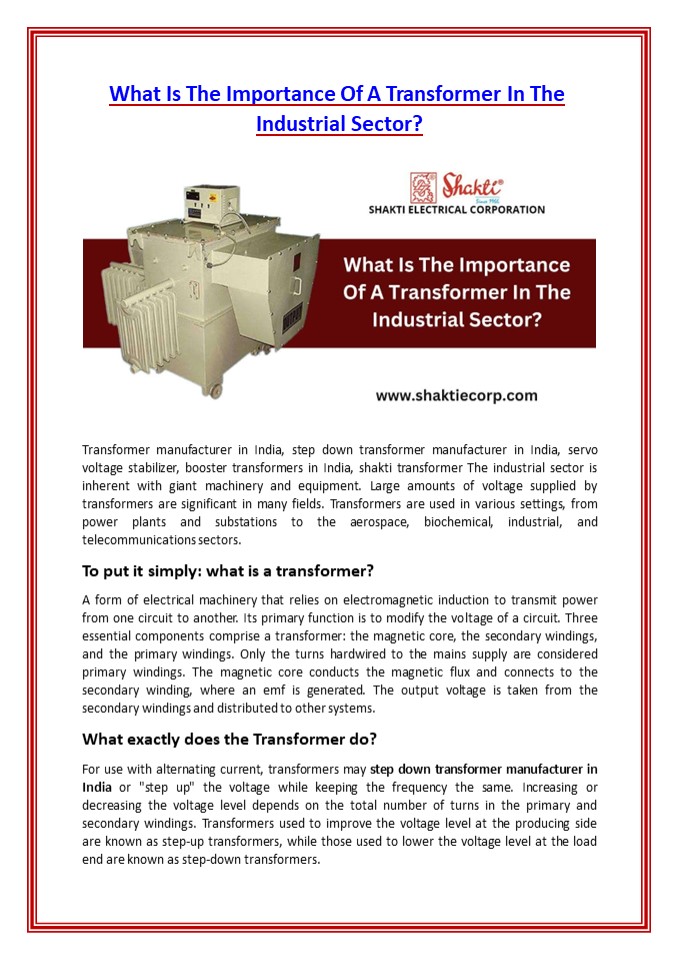What is the Importance of a Transformer in the Industrial Sector?
Title:
What is the Importance of a Transformer in the Industrial Sector?
Description:
Important considerations to make before purchasing a transformer. Read this blog. Want to buy? Then Shakti Electrical Corporation is a preeminent transformer manufacturer in India. – PowerPoint PPT presentation
Number of Views:1
Title: What is the Importance of a Transformer in the Industrial Sector?
1
What Is The Importance Of A Transformer In The
Industrial Sector?
Transformer manufacturer in India, step down
transformer manufacturer in India, servo voltage
stabilizer, booster transformers in India, shakti
transformer The industrial sector is inherent
with giant machinery and equipment. Large amounts
of voltage supplied by transformers are
significant in many fields. Transformers are used
in various settings, from power plants and
substations to the aerospace, biochemical,
industrial, and telecommunications sectors. To
put it simply what is a transformer? A form of
electrical machinery that relies on
electromagnetic induction to transmit power from
one circuit to another. Its primary function is
to modify the voltage of a circuit. Three
essential components comprise a transformer the
magnetic core, the secondary windings, and the
primary windings. Only the turns hardwired to the
mains supply are considered primary windings.
The magnetic core conducts the magnetic flux and
connects to the secondary winding, where an emf
is generated. The output voltage is taken from
the secondary windings and distributed to other
systems. What exactly does the Transformer
do? For use with alternating current,
transformers may step down transformer
manufacturer in India or "step up" the voltage
while keeping the frequency the same. Increasing
or decreasing the voltage level depends on the
total number of turns in the primary and
secondary windings. Transformers used to improve
the voltage level at the producing side are
known as step-up transformers, while those used
to lower the voltage level at the load end are
known as step-down transformers.
2
- A booster transformer in India might also be
constructed with the same number of coils on
either end. Thus, the voltage will remain
constant. They are, nevertheless, designed to
keep people safe. - Applications of Transformers
- Generally, the power from power generation plants
is produced at 3.3/6.6/11 kV. At generating
substations, the voltage is increased to
extremely high levels (66/132/220/400 kV) to
decrease transmission line (carries power to end
consumer) losses. Step-up power transformers are
the correct term for these devices. - But, this high voltage cannot be used as it is at
the end. So, the voltage should be again
decreased to the end-use of (6.6/3.3/0.433 kV).
Both step-up and step-down transformers are used
to adjust the voltage up or down at specific
points where it has to be changed. - Importance of Transformers in the Industrial
Sector - The industrial sector must ensure appropriate,
safe and careful power supply usage to avoid
unnecessary power issues. - Automobile Industry
- To charge the batteries of multiple electric
vehicles at a time, customized smart
transformers are designed nowadays. They can
monitor the voltage levels and enable cost-
savings as well. - Electrochemical Industry
- In electrochemical industries, electroplating is
a common process. Rectifier transformers are
crucial in various electrolyzing elements such as
copper, zinc, aluminium, chlorine, etc. - Steel Manufacturing Industry
- Specifically, customized transformers are used
here to ensure high voltage supply safely. They
are well-built to bear a steel furnace's
dielectric, mechanical, and thermal constraints.
They are also utilized in several other sectors,
including aerospace, military, biochemical and
biological, information processing,
communications, manufacturing, etc. - Important Considerations to Make Before Purchasing
a Transformer - It's essential to keep specific points in mind
while purchasing a transformer. - Electrical Phases
- First, determine if a single- or three-phase
Transformer is necessary. Simple equipment and
household power appliances need single-phase
transformers, and commercial and industrial
applications need three-phase transformers.
3
- kVA Requirement
- It's important to note the load requirements
before choosing a transformer. If huge loads are
to be maintained, the Transformer with more
capacity should be selected. - Voltage requirement
- You need to find the input voltage supply and
check the necessity of the servo voltage
stabilizer required for different devices. - Frequency requirement
- Transformers in India typically operate at 50 Hz,
as does the country's universal power grid.
However, in the United States and other nations
with different power grids, the transformers are
built to support a frequency of 60 hertz. - Place
- Indoor or outdoor placement is acceptable for
transformers. The appropriate Transformer must
be chosen considering factors like size,
function, and installation environment.
Consequently, a factory, a housing complex, or a
shopping mall must have a reliable system to
regulate the voltage and control the power
supply. Concerning transformers, Shakti
transformer is among the most significant brands
you can buy. The Shakti Electrical Corporation
is a preeminent transformer manufacturer in
India, manufacturing power transformers,
distribution transformers, isolation
transformers, and ultra-isolation transformers
that can be tailored to the specific requirements
of their international clientele. - Source Link https//www.problogs.in/importance-of
-a-transformer-in-the-industrial-sector



















![Market Report on China Industrial Robot Industry [2015-2019] PowerPoint PPT Presentation](https://s3.amazonaws.com/images.powershow.com/8336262.th0.jpg?_=201512240310)











